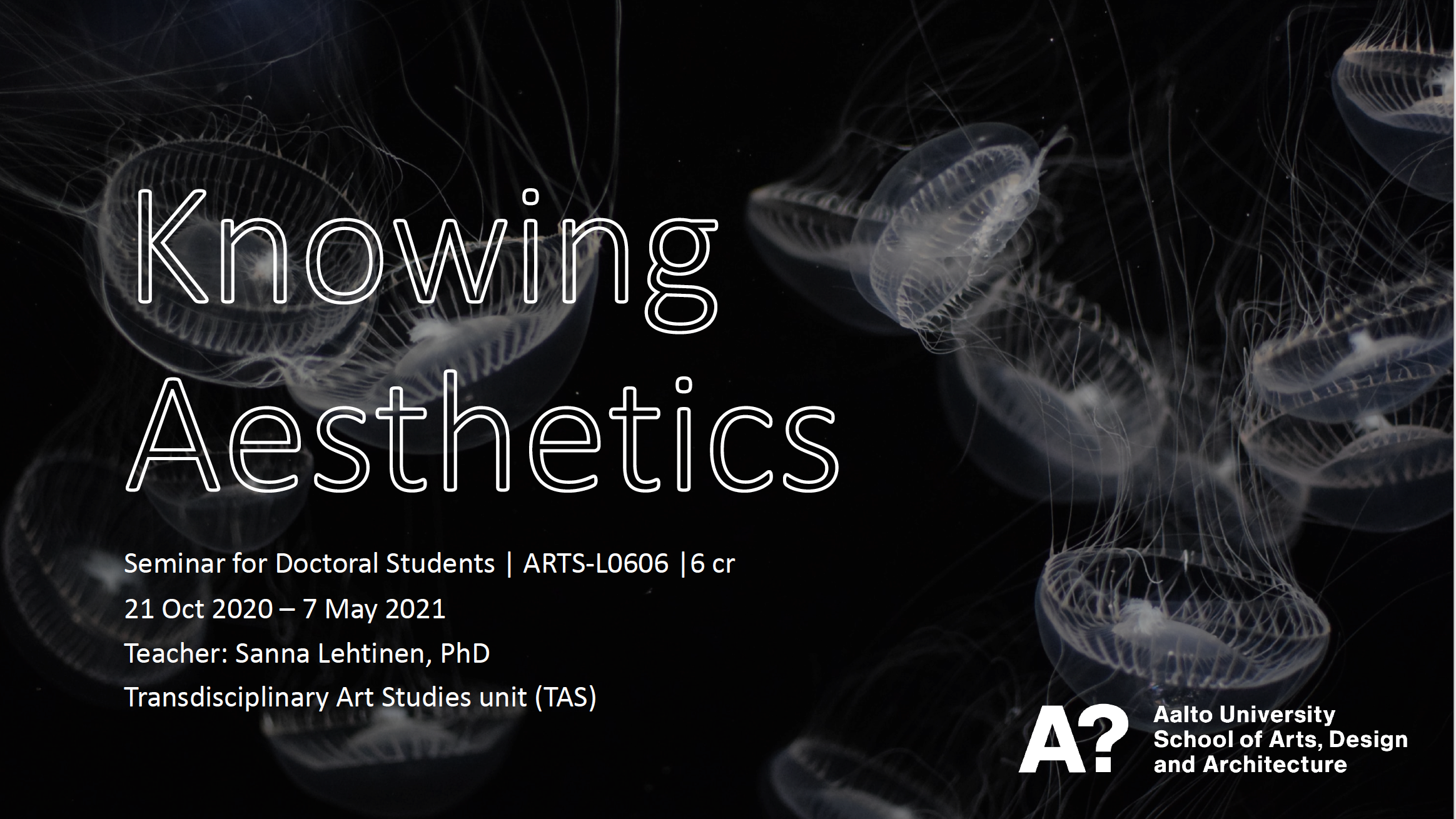
Please note! Course description is confirmed for two academic years, which means that in general, e.g. Learning outcomes, assessment methods and key content stays unchanged. However, via course syllabus, it is possible to specify or change the course execution in each realization of the course, such as how the contact sessions are organized, assessment methods weighted or materials used.
LEARNING OUTCOMES
The course focuses on central philosophical questions and concepts concerning aesthetics of design, media, architecture, and art. Emphasis in course materials and discussions is on applicable approaches that give theoretical support to Aalto ARTS’ doctoral students’ research topics. Core concepts include aesthetic values and qualities, interpretation, intentionality, taste, mediation, and aesthetic experience.
After the completion of the course, the students will be able to identify and explain central themes and concepts of philosophical aesthetics. They will be able to choose theories which are relevant to their research topics and to apply and further develop these to support their work. The students will show proficiency in critical thinking and argumentation by demonstrating their academic communication skills both in written and oral form.
Credits: 6
Schedule: 23.10.2020 - 07.05.2021
Teacher in charge (valid 01.08.2020-31.07.2022): Turkka Keinonen
Teacher in charge (applies in this implementation): Sanna Lehtinen
Contact information for the course (valid 07.10.2020-21.12.2112):
sanna.lehtinen@aalto.fi
CEFR level (applies in this implementation):
Language of instruction and studies (valid 01.08.2020-31.07.2022):
Teaching language: English
Languages of study attainment: English
CONTENT, ASSESSMENT AND WORKLOAD
Content
Valid 01.08.2020-31.07.2022:
A selection of contemporary research articles from philosophical aesthetics is read independently by the students and then presented and discussed together during contact sessions (fall term). The themes of the readings include approaches from e.g. aesthetic theory, everyday and environmental aesthetics, applied aesthetics, aesthetics of technology, and philosophy of art. During the spring term, the students will write and present academic essays which are based on fall term readings. The essays will be commented on by another student and then discussed together with the group during contact sessions.
Applies in this implementation:
A selection of contemporary research articles from philosophical aesthetics is read independently by the students and then presented and discussed together during contact sessions (fall term). The themes of the readings include approaches from e.g. aesthetic theory, everyday and environmental aesthetics, applied aesthetics, aesthetics of technology, and philosophy of art. During the spring term, the students will write and present academic essays which are based on fall term readings. The essays will be commented on by another student and then discussed together with the group during contact sessions.
Assessment Methods and Criteria
Valid 01.08.2020-31.07.2022:
Seminar meetings: reading all assigned articles and presenting one of them (fall term), writing and presenting one's paper, commenting on one paper of a peer student (spring term).
Required: completion of the given tasks. 75% of the grade will come from the academic essay, 25% from 2 presentations and commenting on other student’s essays. Passing with grade 5 requires more than 80% attendance + active contribution. Passing with grade 1 requires more than 50% attendance.
Workload
Valid 01.08.2020-31.07.2022:
6 ects
162 hours, contact hours 40h, independent work 122 h.
DETAILS
Study Material
Valid 01.08.2020-31.07.2022:
Course literature in MyCourses
Prerequisites
Valid 01.08.2020-31.07.2022:
none
Registration for Courses
Valid 01.08.2020-31.07.2022:
Weboodi
Applies in this implementation:
In 2020-21 the course will be taught fully online (Zoom and MyCourses).
SDG: Sustainable Development Goals
5 Gender Equality
13 Climate Action
16 Peace and Justice Strong Institutions
FURTHER INFORMATION
Further Information
Valid 01.08.2020-31.07.2022:
Minimum number of participants: 8
Maximum number of participants: 15
Alternative ways to pass the course must be agreed with the teacher.Applies in this implementation:
In 2020-21 the course will be taught fully online (Zoom and MyCourses).
